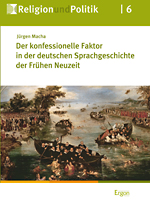"Confession" in German language history in the Early Modern Period

German philologist Jürgen Macha offers a systematical analysis of the influence of confession in German historical linguistics. Beginning with the Reformation and far beyond the Enlightenment, the factor ‘confession’ has been enscribed into the collective linguistic ‘household’ of speakers of German. Partly, its effects can even be observed in today’s use of language. This study is the first that undertakes a survey and a classification of historical linguistic phenomena that, in different ways, are related to the interdependency of language and confession in the early modern period. It looks at constancy and change of the autochthonous culture of language under the influence of confession and political rule in different territories. Furthermore, it discusses the effects of confessionalism to ritual forms of expression within different confessions. In this context, the book offers contrastive investigations with respect to various types of texts such as inscriptions of bells, epitaphs and funeral speeches. Linguistic confessionalisms as ‘signa distincitva’ can be found at different levels of language analysis, as for instance the ‘Lutheran e’ or the ‘Lutheran t’ in ‘predigt’. Finally, the influence of confession on the vernacular is dealt with in the closing chapter.
Literature: Macha, Jürgen, Der konfessionelle Faktor in der deutschen Sprachgeschichte der Frühen Neuzeit (Religion und Politik, vol. 6), Würzburg: Ergon 2014.

